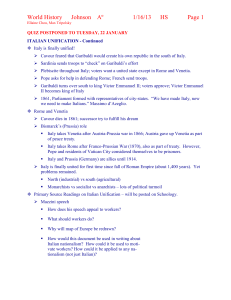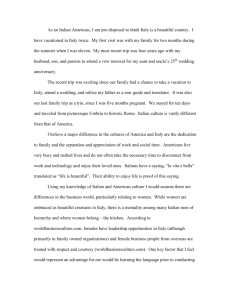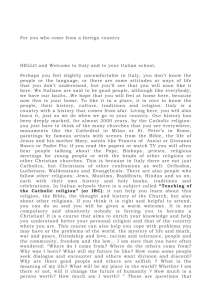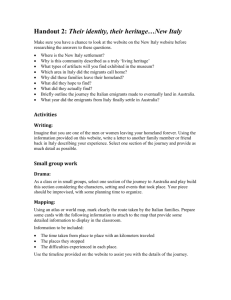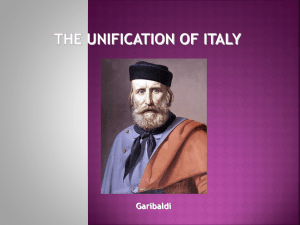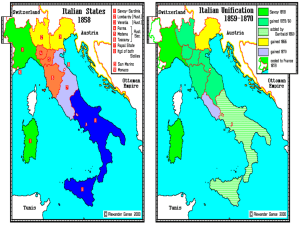Unifying Italy
advertisement
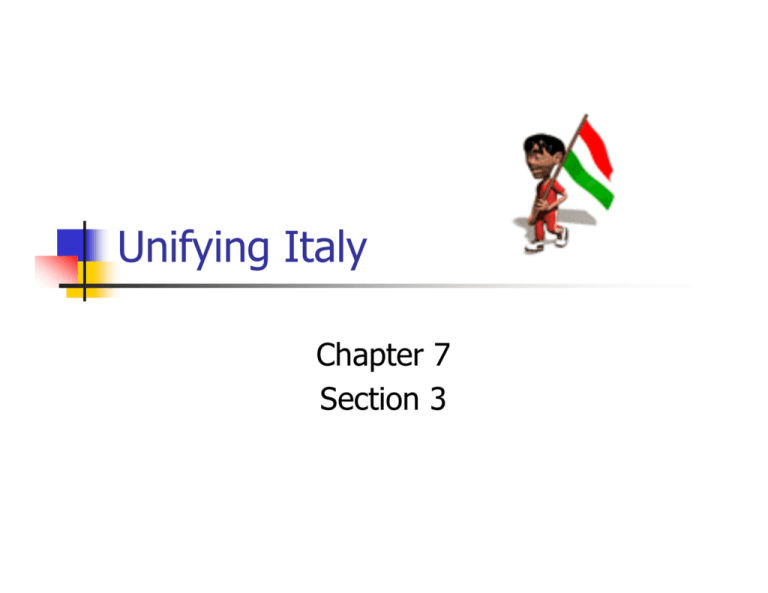
Unifying Italy Chapter 7 Section 3 STOP!!! Watch this 5 minute video about Italian unification: http://www.youtube.com/watch?v=FDR 71qy05vE Introduction Peoples of Italian peninsula had not been unified since Roman times By the early 1800s, Italianspeaking patriots were determined to build a new, united Italy As in Germany, Napoleon’s invasions sparked dreams of nationalism because France ruled many parts of Europe Italy Before Unification Note that each Italian state was independent prior to Italian unification. Each state had its own leader, government, laws, etc. Italy Today Giuseppe Mazzini Italian nationalist leader (1830s) Mazzini founded “Young Italy”, a secret society to promote a free, independent, republic nation To nationalists like Mazzini, establishing a unified Italy made sense because of geography, common language, and history It made economic sense because it would end trade barriers among Italian states Unification would stimulate industry to allow Italy to prosper economically Giuseppe Mazzini Victor Emmanuel II Constitutional monarch (king) of Sardinia Hoped to join other states with Sardinia to increase his power 1852: he appointed Count Camillo Cavour as Sardinia’s prime minister Cavour’s long-term goal was to end Austrian power in Italy With help from France, Sardinia defeated Austria and annexed (take control of) Lombardy, a northern province Meanwhile, nationalist groups overthrew Austrianbacked leaders in other northern Italian states Camilo di Cavour Victor Emmanuel II King of Sardinia Giuseppe Garibaldi In the south, Giuseppe Garibaldi had recruited a force of 1,000 red-shirted volunteers Garibaldi and his “Red-Shirts” quickly won control of the island of Sicily They then crossed to the mainland and marched triumphantly to Naples (“Napoli”) Garibaldi turned over both regions to King Victor Emmanuel II In 1861: Victor Emmanuel II was crowned king of Italy Only Rome (Vatican City) and Venetia (Venice) remained outside of the new nation Giuseppe Garibaldi Red Shirt United Italy During the Franco-Prussian War, however, France was forced to withdraw its troops from Rome to fight against Prussia in 1870 No more French troops on the Italian Peninsula! Additionally, Italy acquired Venetia in a deal with Bismarck after the Austro-Prussian War For the first time since the fall of the Roman Empire, Italy was a united land Government Problems Italy faced many problems as anarchists and radicals struggled against the conservative government Anarchists turned to violence and sabotage to achieve their goals Tensions grew between the north and the south To distract attention from troubles at home, the government send its military overseas to establish an Italian empire in Ethiopia Ethiopia Italy Economic Differences North was richer, more industrial, and had more cities South was poor and rural with a less educated population Still, Italy developed economically and the population grew For many, however, emigration offered a chance to improve their lives Large numbers of Italians left for the United States, Canada, and Latin America for a better life Italians Emigrating For a Better Life Powerpoint Questions (16 points) 1. What was “Young Italy”? 2. Who founded Young Italy? 3. Why did it make sense to unify Italy according to Italian nationalists? (3 points) 4. What was the economic sense in unifying Italy? 5. Who was the monarch of Sardinia? 6. Who was appointed as Sardinia’s prime minister? 7. Explain Cavour’s long term goal. Powerpoint Questions 8. Who was the southern Italian nationalist leader? 9. What was the name of the volunteer military force? 10. In 1861, who was crowned king of Italy? 11. What caused France to remove its military force from Italy? 12. Define anarchist (hint: look in the textbook, Ch. 7.3) 13. How would you describe the economic differences between northern and southern Italy? Explain. 14. Define emigration. (hint: look in the textbook, Ch. 7.3) The End
